All the ways sexual harassment and inequality were called out at the Golden Globes
From the dress code to some brilliantly pointed red carpet interviews - here's the many ways women (and men) made their voices heard
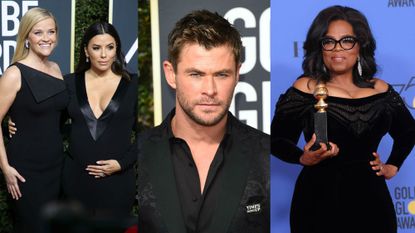

From the dress code to some brilliantly pointed red carpet interviews - here's the many ways women (and men) made their voices heard
As predicted, sexual harassment and gender inequality dominated the conversation at the 2018 Golden Globes. From activist plus ones and Time's Up pins to blistering acceptance speeches - here's the many ways women and men made their point.
The all-black Golden Globes dress code
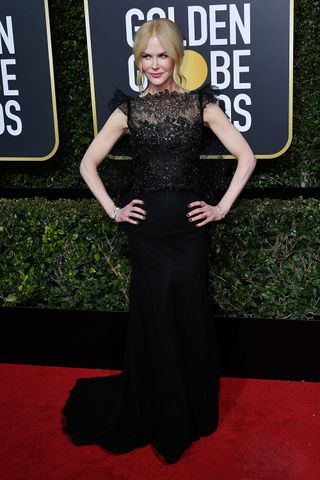
The Golden Globes red carpet is normally a riot of colour. Not so this year, as virtually every attendee adhered to a subdued all-black dress code in solidarity with victims of sexual harassment. Some chose to accessorise with small flashes of colour, like Allison Williams, whose Armani gown featured a stripe of burnt orange, but the overall palette was black, black and more black. Though as Angelina Jolie put it, 'The dress code didn't say anything about not looking our best.'
The Golden Globes protest pin
Following the launch of Reese Witherspoon's Time's Up campaign - a defence fund for victims of workplace sexual harassment and discrimination - costume designer and stylist Arianne Phillips created over 500 Times Up pins for A-listers to wear on the red carpet. Given most guys wear black every year at the Golden Globes, the pins were a chance for men such as Chris Hemsworth and Justin Timberlake (as well as women) to show their support.
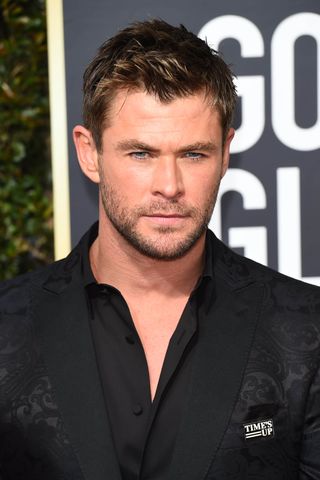
The inspiring activist plus ones
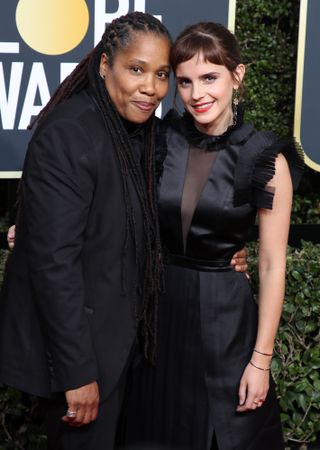
Emma Watson, Meryl Streep and Michelle Williams used their Golden Globes plus ones to celebrate female activists this year. Michelle Williams brought Tarana Burke, founder of the #MeToo movement, Meryl Streep came with Ai-jen Poo, the director of the National Domestic Workers Alliance, and Emma Watson posed for photos arm-in-arm with Marai Larasi, executive director of Imkaan.
'We're here (tonight) because of Tarana', Michelle Williams said in a red carpet interview, 'we are here because Tarana started a movement, she planted a seed and it has grown and caught fire.'
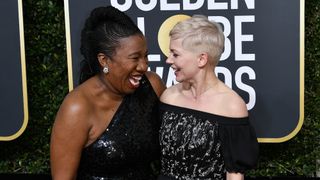
A savage opening monologue from Seth Meyers
Post #MeToo, Golden Globes presenter Seth Meyers was under pressure to strike just the right tone - addressing sexual harassment and gender inequality in a comedic style without trivialising it. But thanks to his SNL and Late Night training, Seth handled it perfectly. 'Ladies and remaining gentlemen' he began, 'happy new year, Hollywood. It's 2018 - marijuana is finally allowed and sexual harassment finally isn't.'
Marie Claire Newsletter
Celebrity news, beauty, fashion advice, and fascinating features, delivered straight to your inbox!
This great little burn from Natalie Portman
https://giphy.com/gifs/goldenglobes-golden-globes-2018-xULW8Eck3bt8Tr76Ew
Despite a watershed year for female directors - Greta Gerwig (Lady Bird) Dee Rees (Mudbound) and Patty Jenkins (Wonder Woman) - not a single woman made the Best Director nominees category this year. Presenting the award, Natalie Portman made her disappointment clear when she came on stage and introduced the 'all male' nominees.
Deborah Messing and Eva Longoria slamming E! over wage inequality (during live E! interviews)
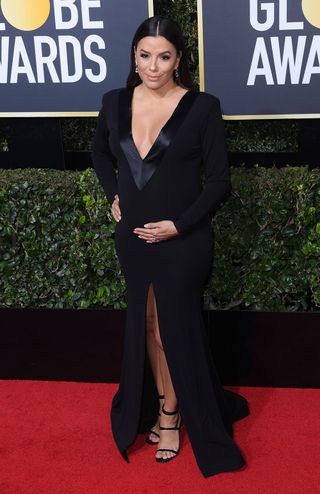
In a red carpet interview with E! host Juliana Rancic, Deborah Messing said 'I am wearing black to thank and honour all of the brave whistleblowers who came forward to share their stories of harassment and assault and discrimination. I was so shocked to hear that E! doesn't believe in paying their female co-hosts the same as their male co-hosts.' Referencing the recent departure of E! host Catt Sadler, who quit the network over pay inequality, Messing added 'So we stand with [Sadler] and that's something that can change tomorrow. We want people to start having this conversation that women are just as valuable as men.'
Eva Longoria then followed suit in an interview with E! host Ryan Seacrest. 'We support gender equity and equal pay, and we hope that E! follows that lead with Catt as well...'
Oprah Winfrey's moving acceptance speech
Few people could crystallise the mood of the night more elegantly than Oprah Winfrey. Here's the full text of her acceptance speech for the Cecil B. DeMille award for lifetime achievement, one that earned her a standing ovation.
"Thank you, Reese. In 1964, I was a little girl sitting on the linoleum floor of my mother's house in Milwaukee watching Anne Bancroft present the Oscar for best actor at the 36th Academy Awards. She opened the envelope and said five words that literally made history:" The winner is Sidney Poitier." Up to the stage came the most elegant man I ever remembered. His tie was white, his skin was black—and he was being celebrated. I'd never seen a black man being celebrated like that. I tried many, many times to explain what a moment like that means to a little girl, a kid watching from the cheap seats as my mom came through the door bone tired from cleaning other people's houses. But all I can do is quote and say that the explanation in Sidney's performance in Lilies of the Field: "Amen, amen, amen, amen." In 1982, Sidney received the Cecil B. DeMille award right here at the Golden Globes and it is not lost on me that at this moment, there are some little girls watching as I become the first black woman to be given this same award. It is an honor—it is an honor and it is a privilege to share the evening with all of them and also with the incredible men and women who have inspired me, who challenged me, who sustained me and made my journey to this stage possible. Dennis Swanson who took a chance on me for A.M. Chicago. Saw me on the show and said to Steven Spielberg, she's Sophia in 'The Color Purple.' Gayle who's been a friend and Stedman who's been my rock. I want to thank the Hollywood Foreign Press Association. We know the press is under siege these days. We also know it's the insatiable dedication to uncovering the absolute truth that keeps us from turning a blind eye to corruption and to injustice. To—to tyrants and victims, and secrets and lies. I want to say that I value the press more than ever before as we try to navigate these complicated times, which brings me to this: what I know for sure is that speaking your truth is the most powerful tool we all have. And I'm especially proud and inspired by all the women who have felt strong enough and empowered enough to speak up and share their personal stories. Each of us in this room are celebrated because of the stories that we tell, and this year we became the story. But it's not just a story affecting the entertainment industry. It's one that transcends any culture, geography, race, religion, politics, or workplace. So I want tonight to express gratitude to all the women who have endured years of abuse and assault because they, like my mother, had children to feed and bills to pay and dreams to pursue. They're the women whose names we'll never know. They are domestic workers and farm workers. They are working in factories and they work in restaurants and they're in academia, engineering, medicine, and science. They're part of the world of tech and politics and business. They're our athletes in the Olympics and they're our soldiers in the military. And there's someone else, Recy Taylor, a name I know and I think you should know, too. In 1944, Recy Taylor was a young wife and mother walking home from a church service she'd attended in Abbeville, Alabama, when she was abducted by six armed white men, raped, and left blindfolded by the side of the road coming home from church. They threatened to kill her if she ever told anyone, but her story was reported to the NAACP where a young worker by the name of Rosa Parks became the lead investigator on her case and together they sought justice. But justice wasn't an option in the era of Jim Crow. The men who tried to destroy her were never persecuted. Recy Taylor died ten days ago, just shy of her 98th birthday. She lived as we all have lived, too many years in a culture broken by brutally powerful men. For too long, women have not been heard or believed if they dare speak the truth to the power of those men. But their time is up. Their time is up.Their time is up. And I just hope—I just hope that Recy Taylor died knowing that her truth, like the truth of so many other women who were tormented in those years, and even now tormented, goes marching on. It was somewhere in Rosa Parks' heart almost 11 years later, when she made the decision to stay seated on that bus in Montgomery, and it's here with every woman who chooses to say, "Me too." And every man—every man who chooses to listen. In my career, what I've always tried my best to do, whether on television or through film, is to say something about how men and women really behave. To say how we experience shame, how we love and how we rage, how we fail, how we retreat, persevere, and how we overcome. I've interviewed and portrayed people who've withstood some of the ugliest things life can throw at you, but the one quality all of them seem to share is an ability to maintain hope for a brighter morning, even during our darkest nights. So I want all the girls watching here, now, to know that a new day is on the horizon! And when that new day finally dawns, it will be because of a lot of magnificent women, many of whom are right here in this room tonight, and some pretty phenomenal men, fighting hard to make sure that they become the leaders who take us to the time when nobody ever has to say 'Me too' again.'
-
 We're fitness experts who've spent 100's of hours testing fit kit - these are the lululemon products we rave about to family and friend
We're fitness experts who've spent 100's of hours testing fit kit - these are the lululemon products we rave about to family and friendKeen to invest in kit that'll last the long run?
By Chloe Gray
-
 Taylor Swift has broken her silence on the meaning of new track ‘Clara Bow’
Taylor Swift has broken her silence on the meaning of new track ‘Clara Bow’By Jenny Proudfoot
-
 George, Charlotte and Louis are learning "new home rules" to help Princess Kate's recovery
George, Charlotte and Louis are learning "new home rules" to help Princess Kate's recoveryBy Jenny Proudfoot
-
 Barbie, Oppenheimer or Poor Things? Here are the biggest Golden Globes winners
Barbie, Oppenheimer or Poor Things? Here are the biggest Golden Globes winnersBy Jadie Troy-Pryde
-
 Here's a look back at last year's winning Golden Globes outfits
Here's a look back at last year's winning Golden Globes outfitsBy Sunil Makan
-
 How to make an awards season speech
How to make an awards season speechPublic-speaking coach Hilary Lyons on how to deliver a knockout Oscars speech (because, well, you never know)
By Lucy Pavia
-
 Here’s who won big at the Golden Globes 2018 (and who didn't)
Here’s who won big at the Golden Globes 2018 (and who didn't)It was a great night for female-led drama, with Big Little Lies, The Handmaid's Tale and Greta Gerwig's Lady Bird dominating the top spots
By Lucy Pavia
-
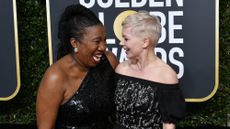 These A-list women just made a political statement with their choice of Golden Globes dates
These A-list women just made a political statement with their choice of Golden Globes dates‘It’s a moment to transform both the written and unwritten rules that devalue the lives and experiences of women’
By Jenny Proudfoot
-
 Actresses will be wearing black to the Golden Globes for this important reason
Actresses will be wearing black to the Golden Globes for this important reasonAnd it's a very powerful statement.
By Jenny Proudfoot
-
 The Golden Globes 2018 nominations have officially been announced
The Golden Globes 2018 nominations have officially been announcedAnd there are some big surprises
By Jenny Proudfoot
-
 The 2018 Golden Globes host has been officially announced
The 2018 Golden Globes host has been officially announcedAnd we couldn’t have called it…
By Marie Claire